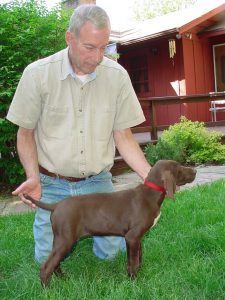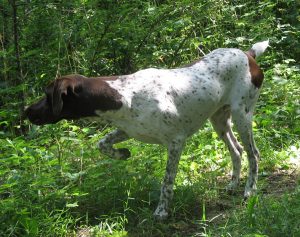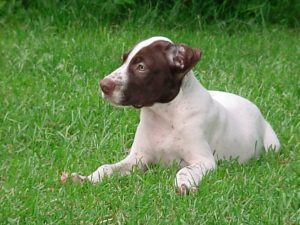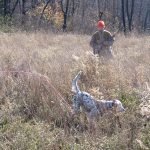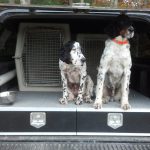Puppy or Started Dog: Which One is Right for You?
POINTING DOG POINTERS May 2017
By Bob and Jody Iler
This is the time of year for all things new – and possibly, also the time for you to get a new puppy! If this is your first pointing dog and you’re eager to have a hunting partner as well as a buddy, you might be considering the idea of buying a started dog instead of a pup.
Let’s take a look at the pros and cons of buying a puppy versus buying a started dog.
By our definition, the started dog is one that has been “started.” In other words, he or she is a young dog that has had plenty of bird work, hunts with drive and desire, and finds and points birds. The started dog is well-developed to the gun, responds to the basics of obedience (including heel, whoa and here, or come), and handles well in the field. In short, you should be able to take your started dog and go hunting.
If the started dog is a natural retriever, he may also retrieve birds well for you. If he’s not a natural retriever, we would still consider him a started dog. In time and with hunting experience, many dogs develop a good retrieve. Some dogs, however, just don’t seem interested and would rather continue hunting for the next bird. (A finished dog retrieves to hand, is steady to wing and shot, and backs other dogs – in addition to all of the above. Don’t expect these advanced skills to be part of a started dog’s abilities, although, as we’ve said, some may be natural retrievers as well as natural backers.)
You can expect to pay at least double the price of a quality puppy for a started dog. For example, if you’re checking out litters with good pedigrees that include titled field dogs, you’ll likely pay anywhere from $600 to $1,000 for a quality puppy. A started dog from the same good bloodlines may cost from $1,500 – $2,000 or more.
Does that mean a puppy is less expensive than the started dog? Not really! When you consider health inoculations and potential training fees if you plan to have your pup professionally trained, you may end up paying more for a pup in the long run. It’s certainly possible to train your new pup yourself, but if you have no experience in this area, it could result in some damaging problems that may keep your pup from reaching his true potential.
As we’ve noted in past columns, it’s much easier to prevent problems when training our dogs than trying to fix a major problem that just may not be fixable. It’s really a good idea to plan on getting at least some help from a pro who specializes in kind, gentle training – one who can help you along as you develop your pup according to pup’s own timetable. The worst thing you can do is try to make your pup into a started dog before he is ready – just because hunting season is rolling around soon!
When purchasing the started dog, you will usually see what you are getting, although there is always an element of a gamble. The owner/trainer/seller will demonstrate the dog’s abilities to you, and will (should) also help you become familiar with how to handle your started dog. He should offer a guarantee as to the dog’s performance and health, with the contingency that you make the effort to learn how to handle your started dog and take his advice on how to do this. He will emphasize how important it is to bond with your new, trained dog – to become his friend and the one he learns to rely on – before you take him out in the field. He should also offer you an open door to communication on any issues that you need advice on after you take your started dog home.
If the dog seems frightened or tucks his tail when working with the seller in the field, these are not good signs. If the seller indicates that he doesn’t want to talk to you after the sale, this also is not a good sign! Back off and search elsewhere. It’s also a good idea to ask to see the dog work in at least a couple different areas, not just the usual training field that the dog is used to.
Puppies also should come with a guarantee as to health and soundness. Good breeders take pride in their dogs and want you to be satisfied. They will offer advice on which pup might be best suited for you, depending on your needs and what type of hunting or field events you plan to do.
Even with the best of intentions, though, buying a puppy is more of a “crap shoot” – because other than seeing pup’s parents and noting their field performance and temperament, a pup can and will develop into a dog that you may not have bargained for. For example, you may want a closer working foot dog, and your pup (with field champions in his pedigree) just may grow into a dog with “wheels,” running off to the horizon as you wonder what to do next!
Do we have a preference when it comes to started dogs versus puppies?
No! Each scenario can be rewarding and successful.
The joys and rewards (and work!) involved in raising a puppy are one of life’s greatest adventures. When that pup grows white in the face or gray in the muzzle, we can look back to the days when she first came home to be part of our lives – back before we knew for sure what kind of pointing dog she would become. The memories will be priceless.
Likewise, the started dog that bonds with us and becomes our inseparable partner in the field has found the home he was waiting for and the chance to prove himself and to help us learn with him. He also, will provide an unforgettable chapter in our lives.
We often talk about the guarantees that should come with our purchase of a pup or started dog. But we feel that as a new pointing dog owner, you should also be willing to make a guarantee to yourself. It should go something like this:
“I promise to the best of my ability that I will love and care for this pointing dog pup (or started dog). I will make every effort to learn to read my dog and figure out what he is trying to tell me by what he does and how he acts. I will not push him too hard; rather, I’ll take my time and together, we will learn from each other. I’ll ask for help from someone who knows more than I do, before I create a problem. I’ll be patient even when I don’t feel like it. I’ll remember that my dog needs quality time and training with me. I’ll try to remember always that he’s the dog, and I’m the person, and to be kind – because I am his world.”
Pointing Dog Pointers features monthly training tips by Bob and Jody Iler, who own Green Valley Kennels in Dubuque, Iowa. Bob and Jody have trained pointing dogs for over 35 years and have written many articles for The Pointing Dog Journal.



